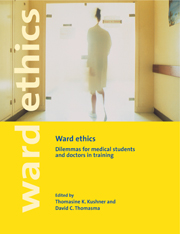Book contents
- Frontmatter
- Contents
- Acknowledgments
- List of contributors
- Prologue. Breaking the silence
- Letter from a young doctor
- Part I On caring for patients
- Section 2 Problems in truth-telling
- Section 3 Setting boundaries
- Part II On becoming a “team player”: searching for esprit de corps and conflicts of socialization
- Section 5 Argot, jargon, and questionable humor: assuming the mantle at the patient's expense
- Section 6 Making waves: questioning authority and the status quo
- Section 7 Perceiving misconduct and whistle-blowing: observing peers or superiors commit an act deemed unethical
- 21 Abusing alcohol or drugs
- 22 Mistreating patients: nasty, rude, or hostile behavior toward patients
- 23 Covering up
- 24 Misrepresenting research
- Epilogue: Using this book
- Glossary
- Index
24 - Misrepresenting research
Published online by Cambridge University Press: 05 February 2015
- Frontmatter
- Contents
- Acknowledgments
- List of contributors
- Prologue. Breaking the silence
- Letter from a young doctor
- Part I On caring for patients
- Section 2 Problems in truth-telling
- Section 3 Setting boundaries
- Part II On becoming a “team player”: searching for esprit de corps and conflicts of socialization
- Section 5 Argot, jargon, and questionable humor: assuming the mantle at the patient's expense
- Section 6 Making waves: questioning authority and the status quo
- Section 7 Perceiving misconduct and whistle-blowing: observing peers or superiors commit an act deemed unethical
- 21 Abusing alcohol or drugs
- 22 Mistreating patients: nasty, rude, or hostile behavior toward patients
- 23 Covering up
- 24 Misrepresenting research
- Epilogue: Using this book
- Glossary
- Index
Summary
CASE
“Was I a coward?”
As an intern I felt privileged to have the opportunity to work in the laboratory of a chief researcher in an area of particular interest to me. At a professional meeting the researcher, who was also head of the lab, presented the results of a study with which I was familiar in a way that I thought inaccurately inflated the potential benefits of the findings. I was aware that the work had been written up and was being submitted for publication. Challenging the researcher's interpretation would be, in my opinion, an act of professional suicide. I also assumed that future attempts to duplicate the results would either prove or disprove the conclusions presented. Was this assumption enough to justify my inaction, or was I just a coward?
CASE
“A faculty member listed his name as first author”
My medical school program involved a special curriculum that required students to write a thesis in a health-related field. As it turned out, my work received acclaim beyond the academic requirements. I was invited to do a presentation at a professional conference and I wrote a paper that was accepted for publication. A faculty member, who had played an important advisory role, listed his name as first author. I felt angry and betrayed but didn't know whether to make an issue of it or not.
- Type
- Chapter
- Information
- Ward EthicsDilemmas for Medical Students and Doctors in Training, pp. 248 - 254Publisher: Cambridge University PressPrint publication year: 2001



